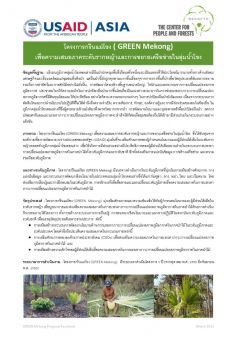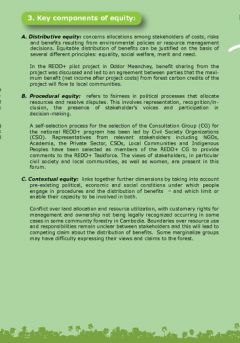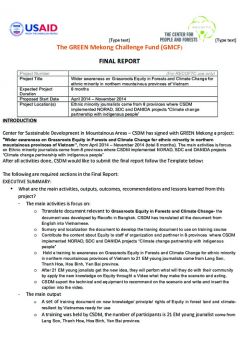Green Mekong Case Study: Na Ot village, Na Ot commune, Mai Son district, Son La province, Viet Nam
This is a case study under the USAID supported "Grassroots Equity and Enhanced Networks in the Mekong Program" for Na Ot village, Na Ot commune, Mai Son district, Son La province, Viet Nam.
Equity in REDD+ Process in Cambodia: Fairness of Treatment for All Steakholders
Effective implementation of REDD+ activities, the integration of environmental, social, and economic needs must be considered to achieve sustainable forest management. The Royal Government of Cambodia and development partners should seek to build community knowledge regarding REDD+ concept, and laws relevant to REDD+.
ความเที่ยงธรรมในการเปลี่ยนแปลงสภาพ ภูมิอากาศและเรดด์พลัส คู่มือฉบับย่อสำหรับวิทยากรกระบวนการระดับรากหญ้า
Công bằng trong Biến đổi khí hậu và REDD+: Sổ tay Hướng dẫn cho Thúc đẩy viên cơ sở
Gồm chuỗi 10 câu hỏi và trả lời nhằm đáp ứng nhu cầu phát triển năng lực của thúc đẩy viên cơ sở, sổ tay này giải quyết một số vấn đề cơ bản về công bằng xã hội trong bối cảnh rừng và BĐKH, khuyến khích các bên liên quan cấp cơ sở cải thiện sự bình đẳng, tham gia và hòa nhập xã hội vào tác động của BĐKH và REDD+
The GREEN Mekong Challenge Fund FINAL REPORT: Center for Sustainable Development in Mountainous Areas (CSDM)
Center for Sustainable Development in Mountainous Areas – CSDM signed with GREEN Mekong a project: “Wider awareness on Grassroots Equity in Forests and Climate Change for ethnic minority in northern mountainous provinces of Vietnam”, from April 2014 – November 2014 (total 8 months). This is the final report.
Carbon Cycling, Climate Regulation, and Disturbances in Canadian Forests: Scientific Principles for Management
Canadian forests are often perceived as pristine and among the last remaining wilderness, but the majority of them are officially managed and undergo direct land use, mostly for wood harvest. This land use has modified their functions and properties, often inadvertently (e.g., age structure) but sometimes purposefully (e.g., fire suppression).
How Can Social Safeguards of REDD+ Function Effectively Conserve Forests and Improve Local Livelihoods? A Case from Meru Betiri National Park, East Java, Indonesia
The National REDD+ (Reducing Emissions from Deforestation and Forest Degradation-Plus) Strategy in Indonesia highlights the importance of local participation and the reform of land tenure in the success of forest conservation. National parks are a main target area for REDD+.
Integrating Forest Cover Change with Census Data: Drivers and Contexts from Bolivia and the Lao PDR
The aim of this paper is to explore possible links between forest cover change and characteristics of social-ecological systems at sub-national scale based mainly on census data.
A study from the perspectives of the forest's owners designated by the Matsudo City green regulations about the opening the privately owned forests
This study is based on the Forest's Owners designated by the Matsudo City Green Regulations. It aims is develop the current Conservation Policy State on Privately Owned Forests and those forests open to the local residents, as well as to examine the achievements and tasks of public visit management and cooperation with citizen's organizations.
Describing local community characteristics in Japanese rural villagesA community survey result and its application to explaining non-industrial private forest owners' behavior
An ecoHealth approach : prediction and prevention of emerging infectious diseases from wildlife : final technical report
Approximately 20% of novel emerging infectious diseases (EIDs) and 50% of emerging and re-emerging zoonotic diseases have been attributed to land-use change. It is a clear threat to global biodiversity and ecosystem services and a key driver of EIDs.









